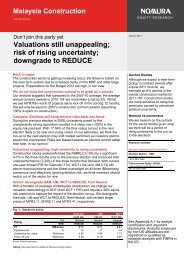Download PDF - ETP - Pemandu
Download PDF - ETP - Pemandu
Download PDF - ETP - Pemandu
Create successful ePaper yourself
Turn your PDF publications into a flip-book with our unique Google optimized e-Paper software.
Formerly known as the International Standards and Liberalisation<br />
(ISL), this Strategic Reform Initiative (SRI) has been renamed as<br />
Competition, Standards and Liberalisation (CSL) to better reflect<br />
competition as a major component of the SRI. SRIs are enablers<br />
that facilitate economic growth through government actions<br />
such as policy and regulatory changes.<br />
There are three components in the CSL, namely the swift<br />
implementation of competition law, adoption of international<br />
standards and best practices and the liberalisation of the services<br />
Exhibit 13.1<br />
Competition Law<br />
Competition Act 2010 aims to<br />
promote economic growth by<br />
promoting and protecting the<br />
process of competition<br />
Competition Law<br />
The Competition Act 2010 was gazetted on 10 June 2010 and<br />
came into force on 1 January 2012. The Act aims to promote<br />
economic development by fostering and protecting the process<br />
of competition that encourages efficiency, innovation and<br />
entrepreneurship. The Act which will govern all firms, including<br />
government-linked companies (GLCs), also provides a regulatory<br />
framework against market manipulation and cartel practices.<br />
The Act seeks to prevent:<br />
• Anti-competitive agreements such as price fixing, market<br />
sharing, bid rigging, limiting or controlling production<br />
• Abuse of a dominant position or monopoly such as unfair<br />
pricing, tying/bundling, refusal to deal and predatory pricing<br />
Overall Increase in Competitiveness<br />
SrI: Competition, Standards and Liberalisation<br />
sector. These are part of the key policy measures recommended<br />
under the New Economic Model (NEM) to create a competitive,<br />
sustainable and innovative environment towards a highincome<br />
nation. Three ministries are involved in overseeing the<br />
implementation of the initiatives under CSL, and these are the<br />
Ministry of Domestic Trade, Cooperatives and Consumerism<br />
for competition law, the Ministry of Science, Technology and<br />
Innovation (MOSTI) for standards and the Ministry of International<br />
Trade and Industry (MITI) for services.<br />
Achievements<br />
Liberalisation<br />
of Services<br />
Opens markets to foreign<br />
investment, encouraging<br />
competition<br />
Standards<br />
Improve quality of Malaysian<br />
goods and services and also<br />
improves access to<br />
international markets<br />
The Malaysian Competition Commission (MyCC) was set up in<br />
April 2011 to enforce the Competition Act 2010. Its main role is<br />
to protect the competitive process for the benefit of businesses,<br />
consumers and the economy. MyCC also has the power to issue<br />
guidelines in relation to the implementation and enforcement of<br />
the competition laws, act as advocate for competition matters,<br />
carry out general studies in relation to issues connected with<br />
competition in the Malaysian economy or particular sectors of<br />
the Malaysian economy, inform and educate the public regarding<br />
the ways in which competition may benefit consumers in, and the<br />
economy of Malaysia.<br />
Various guidelines have been drawn up for the Competition<br />
Act 2010 on ‘Complaints’, ‘Definition of Market’, and ‘Chapter 1<br />
Infringements’. 35 advocacy programmes were undertaken in<br />
2011 to promote the Act and to facilitate understanding relating<br />
to compliance with the Act.<br />
215








